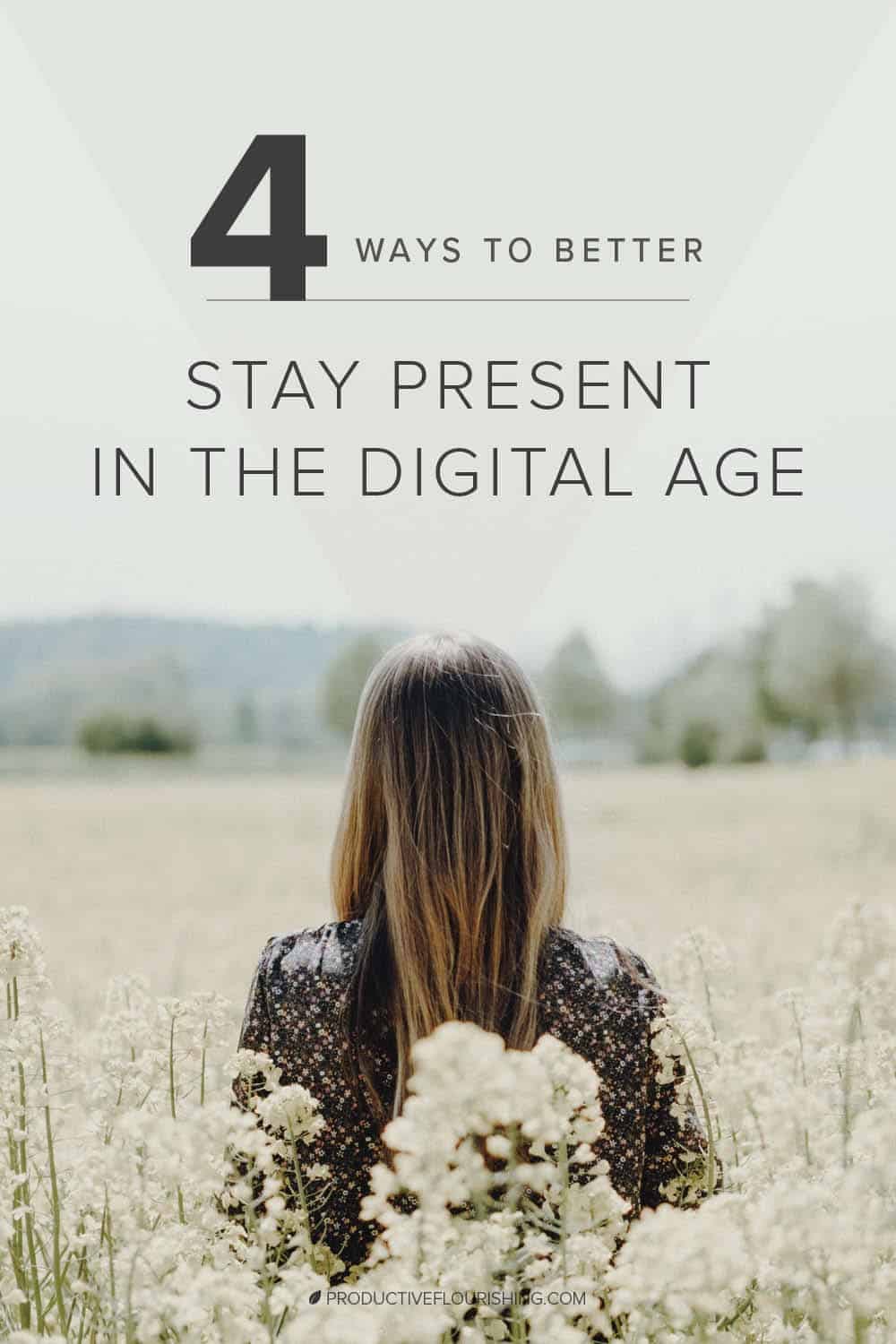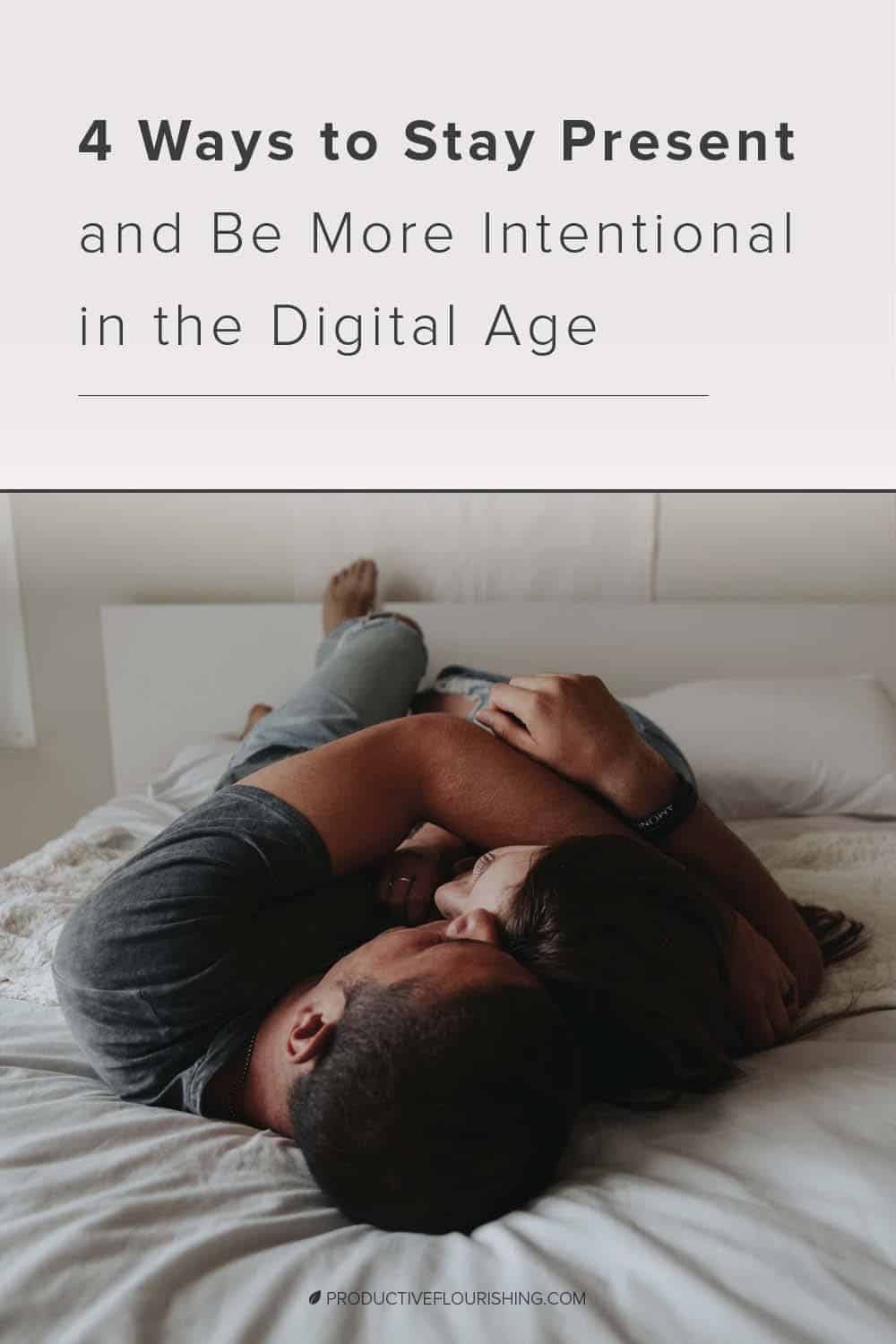4 Great Ways to Stay Present in the Digital Age

Editor's note: This post stems from a podcast episode of the same topic. Check out the episode "Is Technology Affecting Your Relationships?".
In recent years, communication technology has drastically changed expectations for the ways we interact with each other.
Before text messages, smart phones, email, and the internet, the world was very different. And the way we communicated with one another was different. When we left someone a message on their answering machine [yes, I’m going way back ????], expectations were that we’d get a response within a few days.
Really think about that: the social norm was that you would expect to hear back from someone within a few days, not within a few minutes or even seconds like what many of experience now.
Consider these old-school communication practices:
25 years ago, when most people made a telephone call, it was typically a transaction. There was a specific goal, both parties involved gave the conversation their full attention, and then the transaction was complete. People didn’t watch tv or do other things while they spoke on the phone.
15 years ago, we would go to the computer to do a specific task, such as write a term paper. We would write it, print it, turn off the computer, and go do something else.
Compare that to the way communication occurs today:
We have week-long text conversations with people.
We’re continually connected to our cell phones or devices with myriads of friends on a wide swath of platforms, from Goodreads to Facebook to Instagram to Twitter.
We interrupt the people we are face to face with to respond to text messages, phone calls, and social media alerts.
Despite the hundreds of “friends,” we feel more disconnected from others than ever before. We are always connected by way of a smartphone in our pocket or a laptop or tablet. These devices remain within reach 24/7. Even when we’re having conversations with one another, devices regularly invade that time together.
That’s a big difference from 15 years ago when it was considered the norm to have face to face conversations free of all the digital distractions.
Where did we get off track? How did our quest for connection produce the opposite effect?
I’m not anti-technology, but I am a firm believer in practicing intentionality. Here are some great ways to stay present in the digital age:
1. Be intentional with your focus.
Multi-threading is having your brain work at different levels. For example, many people watch Netflix, scroll social media, and text with friends at the same time. Things like this are much more common now than they were 25 years ago when it was rare to split your attention between the television and telephone at the same time.
As a result of today’s split attention, we’re all experiencing a lack of true connection. In fact, it can feel like no one is willing or able to slow down to be fully present with you. Deeper social, emotional, and spiritual conversations can’t happen when our conversations are flooded with a steady stream of interruptions.
Be intentional with your focus. Work at being completely present with what’s in front of you. If something interrupts, like a phone call you must take, excuse yourself until you’re able to come back with your full attention.
2. Be intentional with your relationships.
We have more “friends” today than ever before, but we’re using these relationships differently and in different contexts. We collect different followers on a variety of platforms, but most of our interactions are limited to a like here and an occasional comment there.
Studies like those by Robin Dunbar (Dunbar’s Number) tell us that while we may have hundreds we’re “connected” to, our capacity for meaningful connection is limited to about 150 people.
When you’re intentional with your relationships, you can create emotional and spiritual containers that allow you to be vulnerable and close. Think about inviting that online friend to dinner or for a walk. It’s a matter of intentionality. Choose your friends intentionally and invest in them.
3. Be intentional with your time away.
Never being offline has a tremendous impact on us. It changes who we are with people and our ability to really show up — at work, the dinner table, synagogues, and our child’s school. This lack of disconnection from our devices diminishes our capacity to be fully present in the moment.
Today’s technology works like a dopamine drip: Did someone like my Instagram post? What about what I put on Facebook? What’s in the news? We’re always on and don’t realize how much our time with technology zaps our attention and energy.
When we step away, we finally get to hear our own voice. We can finally start to clear out the anxiety, fear, and comparisitus that actually drives all these media channels.
4. Create boundaries for yourself.
Successful people get ahead in the time that other people waste. — Henry Ford
Limiting our social media use and creating boundaries around digital technology can be very powerful. I’m certainly not saying that all time on social media is wasted, but I do encourage you to really think before you click or swipe.
There’s a study that says the apps we use the most on our phones are actually the ones making us the least happy. When consuming online content, consider asking yourself, “How will knowing this information contribute to my day? Is it the best thing for me right now? Will this experience make my day better?”
It’s hard work to do work that matters. It’s hard work to show up and do our creative thing and create our art. And it’s challenging to summon our courage to say, “I have something for the world.”
When we dedicate more time to the things that truly fulfill us (showing up, creating, etc.), we expand our capacity to create. We also boost our happiness.
It may sound like I’m down on technology and social media. That’s not true. I love technology. But for some of us, good decisions can’t come until we shut it all down and take our personal power and brains back.
When we step away from technology we’re able to create healthy space to do our best work and nourish meaningful relationships; this allows us to contribute to the world in ways that really matter with people who really matter to us. (Tweet this.)
Be intentional about your relationships instead of striving to get more likes and retweets from people you don’t know and will likely never meet. Here are a few tips to help manage this:
Just because a thing has some benefit doesn’t mean it’s beneficial to you. Does technology’s benefit outweigh all the other costs of using that technology? If not, make different choices.
Rather than ditching all social media, figure out a time to call or text your friends and have a tighter connection rather than just liking their Facebook photo.
Go out to dinner with someone instead of engaging in a weeklong text conversation. This is all about trading off one thing that may not be serving you well for another thing that’s serving you better.
Take stock of how you’re using technology to be in connection with other people. What would happen if you removed some of these distractions from your daily flow? What would change for you if your relationships were deeper and richer and more satisfying? What one small step can you take today to feel more deeply connected to someone that matters to you?







